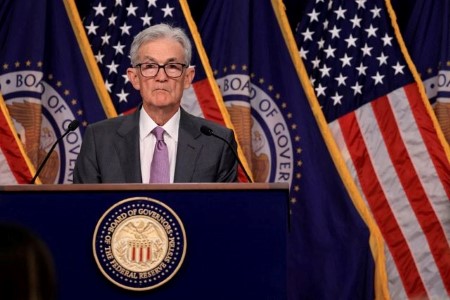




January Economic Update: Growth slows, prices rise
 DOWNLOAD
DOWNLOAD

Inflation Update: Up, up, and away?
 DOWNLOAD
DOWNLOAD

Quarterly Economic Growth Release: Growth takes on a slower pace
 DOWNLOAD
DOWNLOAD


Investors’ black-tinted glasses obscure Fed’s role

LONDON – From Tokyo to Seoul, from London to Frankfurt, equities traders’ screens are spewing red on Monday. Japan’s tighter monetary policy and pricey artificial intelligence stocks are playing a part, but the markets’ biggest fear is that of a US recession. However, investors hoping that Federal Reserve Chair Jay Powell will help by rapidly slashing rates are likely to be disappointed.
Stock markets have been rudely awoken from dreams of an economic “soft landing”. Instead of an ideal situation in which inflation glides back to a manageable 2% while the US and global economies avoid contractions, major equities indexes are now signaling the prospect of a messier ending to a long boom.
On Monday, Japan’s Nikkei 225 index slumped nearly 13% in its biggest one-day percentage fall since October 1987. In Europe, the benchmark Stoxx 600 index has lost 6% in August’s three trading days, while the FTSE 100 index is down 4% in the same period. In the United States, the tech-heavy Nasdaq Composite index is already 10% below the peak touched on July 10. And futures markets suggest the rout may continue when US trading begins.
The decision by the Bank of Japan to raise rates, disappointing results by the likes of Microsoft, Alphabet, and Intel, coupled with their AI-inflated valuations, contributed to the gloomy mood. News at the weekend that legendary investor Warren Buffett had halved his stake in Apple didn’t help.
But the darkest threat is a US recession. That would be a shock. When Bank of America surveyed global fund managers in July, nearly 70% said they expected a soft landing. But there are some worrying signs that the economy is stuttering: unemployment rose to 4.3% in July — close to a three-year high. Hiring is slowing to levels that in the past have heralded recessions, according to the “Sahm rule”, a measure of how fast unemployment is rising developed by former Fed economist Claudia Sahm. Weak earnings from Oreo-maker Mondelez MDLZ.O and other consumer giants have compounded fears of a fragile US consumer.
Traders would like Powell to bail them out. Since Friday, they have ramped up bets that US rates will plunge from the current range of 5.25% to 5.50%. They now expect three consecutive cuts for a total of 125 basis points by December, derivatives prices collected by LSEG show.
Such a rapid series of cuts would be unheard of outside of a deep recession or financial crisis. Yet the US economy is still growing at an annual rate of 2.5%, according to the Atlanta Federal Reserve’s current estimate. While unemployment is ticking up, it is at an historically low level, and less than half the rate during the 2009 recession. Lastly, inflation remains above the Federal Reserve’s 2% target. The weakening backdrop may well prod Powell to start lowering rates. But he would be ill-served to heed the market’s strident call for emergency stimulus.
CONTEXT NEWS
Stock markets in Asia and Europe tumbled on Aug. 5, as fears of a US recession, high valuations of technology stocks, and high-profile share sales by Warren Buffett sent traders looking for cover.
The Swiss franc, US Treasuries, and German government bonds – assets that are considered safer than most – all rose, amid signs the rout will continue once US stock markets open for the week.
Japan’s benchmark Nikkei average closed 12.40% lower at 31,458.42, its largest one-day fall since October 1987, while the broader Topix lost 12.48% to 2,220.91.
European stocks opened 1.8% lower with France’s CAC 40 down 2.1%, Spain’s IBEX down 2.8%, and the UK’s FTSE 100 off 1.7% in morning trading.
(Editing by Neil Unmack, Oliver Taslic and Streisand Neto)
This article originally appeared on reuters.com





 By Reuters
By Reuters